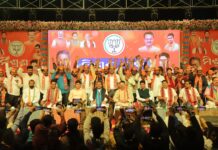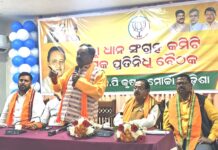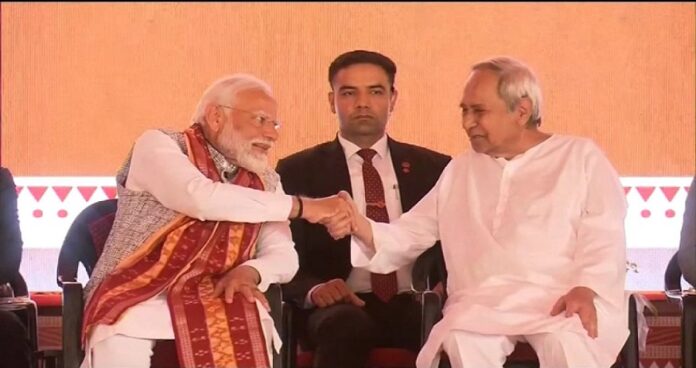By Dr Bhabani Shankar Nayak
LONDON: There are numerous sources of political leadership in Indian politics, spanning from familial political legacies to issues rooted in economics, society, and culture. Political leadership emerges from various quarters, including familial lineages, socio-economic concerns, religious affiliations, ethnic identities, cultural movements, linguistic divisions, and ideological mobilizations.
Additionally, the evolution of market-driven democracies has ushered in leaders from corporate and bureaucratic backgrounds. Odisha politics is no different while looking at the nature and origin of political leadership in the state. Mr Naveen Patnaik is a product of power, prosperity, and privilege due to the lineage of his father, Mr Biju Patnaik. He neither understands Odisha nor understands the everyday struggles of working people in the state. He managed Odisha’s political landscape for more than two decades with shrewd political managerialism.
In the backdrop of Odisha, the passing of Biju Patnaik and the autocracy of the Congress Party sparked a profound political crisis. This void paved the way for the emergence of the Biju Janata Dal (BJD), a regional political entity spearheaded by Mr. Naveen Patnaik. Initially perceived as a somewhat hesitant leader, Mr. Patnaik gradually rose to prominence, enticed by the promises of influence, gratification, and privilege.
However, such pragmatic and opportunistic leadership often faces its downfall, weaving a narrative of political demise through self-inflicted wounds. These leaders navigate a political terrain lacking in ideological foundations, propelled solely by the pursuit of power, devoid of principled governance. Mr. Naveen Patnaik, in aligning with Hindutva forces in the state, seems to be scripting his own political demise. By aligning with the BJP, Patnaik seeks to pre-empt any potential threat to his political dominance and ensure the continuity of his governance agenda, albeit within a new alliance framework.
In the opportunist political landscape of Indian politics, political alliances often define the course of governance and the fate of political leaders. The recent move by Mr Naveen Patnaik, the seasoned leader, and Chief Minister of Odisha, to align with the Bharatiya Janata Party (BJP) has sparked intense speculation and debate. Is this decision a political suicide mission, risking the support base carefully nurtured over decades, or a shrewd calculation to secure electoral gains?
Mr Naveen Patnaik, the projected enigmatic figure at the helm of Odisha’s political affairs for over two decades, has carved a distinct niche for himself in Indian politics. His regional party, the Biju Janata Dal (BJD), has enjoyed unparalleled dominance in Odisha, largely owing to Patnaik’s astute leadership, welfare schemes, and ability to maintain a delicate balance between various socio-political factors. The BJD’s success has often been attributed to its non-alignment with national parties, allowing it to focus on Odisha’s unique needs and aspirations.
However, in a surprising turn of events, Patnaik’s BJD recently decided to join hands with the Bharatiya Janata Party (BJP). This move has left many political analysts baffled, questioning the rationale behind Patnaik’s departure from his long-standing policy of equidistance from national parties. One perspective suggests that this decision could spell political suicide for Patnaik and the BJD, alienating their core support base, which has been nurtured on the platform of regional autonomy and identity. Patnaik’s decision to align with a party often viewed as centralizing and majoritarian could erode the trust of Odisha’s diverse populace, comprising various ethnic, linguistic, and socio-economic groups.
On the other hand, a closer examination of the political landscape reveals the intricate arithmetic behind Patnaik’s move. With the BJP’s growing influence across India and its ambitious expansion plans in eastern states, including Odisha, Patnaik’s alliance with the NDA could be seen as a pragmatic step to safeguard Odisha’s interests within the central government. By forging ties with the ruling coalition at the center, Patnaik aims to secure developmental projects, funds, and policy support for Odisha, leveraging his position as a crucial ally in the BJP fold.
The burgeoning alliance between the BJD and the BJP heralds a significant shift in the state’s political dynamics, paving the way for a closely watched electoral spectacle. This strategic alignment is poised to alter the contours of democratic politics in Odisha, with both Mr. Narendra Modi and Mr. Naveen Patnaik emerging as key beneficiaries. While power itself may not be the cohesive force in politics, the shared pursuit of political opportunism often unites leaders under the guise of serving the people’s welfare.
Mr. Naveen Patnaik’s reintegration into the political alliance under the stewardship of Mr. Narendra Modi signals yet another manifestation of the prevailing principle-free landscape in Indian politics. In this milieu, the relentless pursuit of state power through majoritarian politics stands as the singular objective. The alliance between the BJD and BJP casts Odisha into an inadvertent whirlwind of political and democratic turmoil, wherein the ruling party forges ties with its principal adversary to erode the foundations of democracy within the state.
This partnership is devoid of any semblance of ideological underpinning or principled governance. Its sole ambition is the consolidation of state power to serve the interests of corporate entities, thereby sacrificing the welfare of the populace at large. Moreover, the tacit objective of this alliance is to pave the way for the ascension of Hindutva forces, which poses a grave threat to the societal fabric of Odisha in the long run.
Mr Naveen Patnaik’s return to the BJP can be viewed solely through the prism of political suicide for the sake of electoral arithmetic. Only time will tell whether this alliance proves to be a masterstroke or a miscalculation in Patnaik’s political journey. The current political equilibrium in Odisha teeters on the brink of both democratic peril and potential political transformation.
While the prevailing political stability hints at a semblance of order, beneath the surface lies a brewing democratic crisis, intertwined with a burgeoning opportunity for change. It is imperative for the people of Odisha to seize upon this momentous juncture to usher in an era of alternative politics—one that prioritizes the welfare of the masses above all else.
In harnessing this opportunity, the citizens of Odisha hold the key to steering the state away from the precipice of political stagnation and towards a future characterized by inclusivity, accountability, and genuine democratic representation. By actively engaging in the political process and demanding meaningful change, they can propel Odisha towards a trajectory defined by peace, progress, and prosperity for all its inhabitants.
(The writer Dr Bhabani Shankar Nayak, hails from Eastern Indian State of Odisha, Presently Teaches at University of Glasgow, London, UK and has 2 Decades of Teaching Experience in British Universities. Views Expressed are Personal).



























